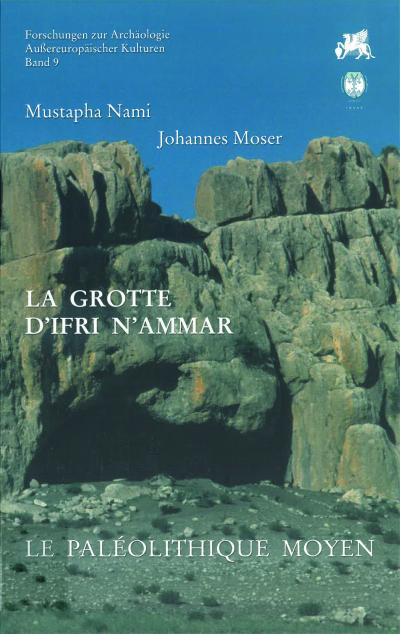La grotte d'Ifri n'Ammar: t. 2 Le Paléolithique Moyen
https://doi.org/10.34780/o4kz-q423
Σύνοψη
Die Forschungen in der altsteinzeitlichen Höhlenstation „Ifri n’Ammar“ stellen seit 1997 ein Schwerpunktprojekt innerhalb des deutsch-marokkanischen Kooperationsprogrammes „Préhistoire et Protohistoire au Rif Oriental Marocain“ dar. Dieses wird in Zusammenarbeit der „Kommission für Archäologie Außereuropäischer Kulturen des Deutschen Archäologischen Instituts“ (KAAK / DAI, Bonn) und des „Institut National des Sciences de L’Archéologie et du Patrimoine“ (INSAP, Rabat) durchgeführt.
Der jetzt vorliegende Band „La Grotte d’Ifri n’Ammar - Le Paléolithique Moyen“ ist in seinem Hauptteil der Untersuchung und chronologischen Einordnung der Steingerätetypen aus den unteren Schichtabfolgen der Ifri n’Ammar-Höhle gewidmet.
Im nordafrikanischen Maghreb ist bis heute lithisches Material der mittleren Altsteinzeit noch immer stark mit den Kulturbezeichnungen Moustérien und Atérien behaftet.
Eine typologische Verbindung dieses regionalen Mittelpaläolithikums zum europäischen Technokomplex des Moustérien wurde schon früh mit den ersten Entdeckungen entsprechender nordafrikanischer Steingerätinventare in den 60er Jahren des 19. Jahrhunderts hergestellt. Zunehmend werden in jüngerer Zeit in der Forschung Stimmen laut, die eine Belegung des nordafrikanischen Mittelpaläolithikums mit dem eurozentrischen Terminus „Moustérien“ kritisieren.
In der Ifri n’Ammar gelingt es durch die Anwendung einer fortschrittlichen Ausgrabungstechnik und dank entwickelter Datierungsmethoden, die Sequenzen des Mittelpaläolithikums besser zu strukturieren und dessen Anfänge zu erfassen. Für die Ifri n’Ammar kann so der zeitliche Rahmen dieses Geschehens mittels Thermolumineszenz-Datierung mit verlässlichen Eckdaten von 171.000 bis 83.000 Jahren vor heute angegeben werden.
Diskutiert wird in diesem Band auch die räumliche Verbreitung des Atérien, dessen Kernzone in den Maghrebstaaten Marokko, Tunesien und Algerien zu suchen ist. Beachtung wird auch vergleichbaren Artefaktinventaren außerhalb dieses Raumes geschenkt.
Stärker ins Rampenlicht gerückt werden auch die aus den Atérien-Schichten der Ifri n’Ammar geborgenen durchbohrten Gehäuse mariner Schnecken, welche angesichts der neuen Datierungen zu den ältesten Schmuckäußerungen der Menschheitsgeschichte zählen. Sie sind somit auch ein Beleg für die Ankunft des anatomisch modernen Menschen in Nordafrika.
Ausgehend vom umfangreichen Fundmaterial aus der Ifri n’Ammar widmet sich diese Abhandlung ferner dem Ziel, eine Neudefinition bestehender Kulturabfolgen zu skizzieren und eine Erschließung des regionalen Kulturablaufes und der Umweltbedingungen während des Paläolithikums im mediterranen Ostmarokko zu ermöglichen.
Im Annex dieses Bandes liefert Rainer Hutterer (Forschungsmuseum Alexander Koenig, Bonn) ausführliche Informationen zur Fauna, Ludwig Reisch (Universität Erlangen) einen Überblick zur Sedimentgenese und Klimageschichte und Daniel Richter (Max Planck Institut für Evolutionäre Anthropologie, Leipzig) eine Zusammenfassung zu den neuen Thermolumineszenz-Datierungen der Fundstelle.
Λέξεις κλειδιά:
Architektur, Archäologie, Höhle, Landschaftsarchitektur, Landschaftsarchäologie, Marokko, Nordafrika, Paläolithikum, Steinzeit, Steinzeit: Altsteinzeit (Paläolithikum)Κεφάλαια
-
Préface
-
Avant-Propos
-
Introduction
-
1 Ifri n’Ammar: quelques données générales
-
2 Analyse du matériel lithique des dépôts de l’occupation supérieure du Paléolithique moyen d’Ifri n’Ammar
-
3 Analyse du matériel lithique des dépôts de l’occupation inférieure du Paléolithique moyen d’Ifri n’Ammar
-
4 Comparaison entre les séries lithiques des deux occupations
-
5 Synthèse et conclusions générale: La place d’Ifri n’Ammar dans l’archéoséquence du Paléolithique moyen au Maroc et en Afrique du Nord
-
Liste des figures
-
Liste des tableaux
-
Liste des dessins des outils lithique
-
Résumé
-
Zusammenfassung
-
صخلم
-
Bibliographie
-
Appendix A: The Middle Palaeolithic vertebrate fauna of Ifri n’Ammar (R. Hutterer)
-
Appendix B: L’analyse sédimentologique de la grotte d’Ifri n’Ammar (L. Reisch)
-
Appendix C: Themoluminescence dating of heated flint artefacts from Ifri n’Ammar (D. Richter)




